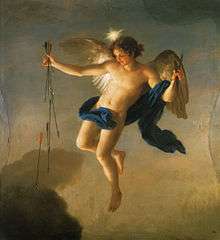Hesperus
In Greek mythology, Hesperus /ˈhɛspərəs/ (Ancient Greek: Ἓσπερος Hesperos) is the Evening Star, the planet Venus in the evening. He is the son of the dawn goddess Eos (Roman Aurora) and is the half-brother of her other son, Phosphorus (also called Eosphorus; the "Morning Star"). Hesperus' Roman equivalent is Vesper (cf. "evening", "supper", "evening star", "west"[1]). By one account Hesperus' father was Cephalus, a mortal, while Phosphorus' was the star god Astraios. Other sources, however, state that Hesperus was the brother of Atlas, and thus the son of Iapetus.[2]

Variant names
Hesperus is the personification of the "evening star", the planet Venus in the evening. His name is sometimes conflated with the names for his brother, the personification of the planet as the "morning star" Eosphorus (Greek Ἐωσφόρος, "bearer of dawn") or Phosphorus (Ancient Greek: Φωσφόρος, "bearer of light", often translated as "Lucifer" in Latin), since they are all personifications of the same planet Venus. "Heosphoros" in the Greek Septuagint and "Lucifer" in Jerome's Latin Vulgate were used to translate the Hebrew "Helel" (Venus as the brilliant, bright or shining one), "son of Shahar (Dawn)" in the Hebrew version of Isaiah 14:12.
There is a tendency to conclude that the ancient Greeks thought that Eosphorus (Venus in the morning) and Hesperos (Venus in the evening), because of the distinction in the names, were two different celestial objects., that the Greeks only later accepted the Babylonian view that the two were the same, and consequently that it was not Babylonian influence that informed the identification of the planets with the two gods. The Greeks dedicated the "wandering star" (planet) to Aphrodite (Roman Venus), as the equivalent of Ishtar. This order of influence is not backed by scholars, nor any historical documents. Rather the two mythological explanations seem to have existed simultaneously and interchangeably.
Eosphorus/Hesperus was said to be the father of Ceyx[3] and Daedalion.[4] In some sources, he is also said to be the father of the Hesperides.[5]
"Hesperus is Phosphorus"
In the philosophy of language, "Hesperus is Phosphorus" is a famous sentence in relation to the semantics of proper names. Gottlob Frege used the terms "the evening star" (der Abendstern) and "the morning star" (der Morgenstern) to illustrate his distinction between sense and reference, and subsequent philosophers changed the example to "Hesperus is Phosphorus" so that it utilized proper names. Saul Kripke used the sentence to posit that the knowledge of something necessary (in this case the identity of Hesperus and Phosphorus) could be empirical rather than knowable a priori.
See also
- Earendel
- Hesperides
- Lucifer, the Latin name for the Morning Star
- The Wreck of the Hesperus
- Aspect of Venus
Notes
- Collins Latin Dictionary plus Grammar, p. 231. ISBN 0-06-053690-X.
- Diodorus Siculus, Bibliotheca Historica 4.27.1.
- Hyginus, Fabulae, 65
- Ovid. Metamorphoses. Book XI, 295.
- Servius. ad Aen. 4,484.
References
- Diodorus Siculus, The Library of History translated by Charles Henry Oldfather. Twelve volumes. Loeb Classical Library. Cambridge, Massachusetts: Harvard University Press; London: William Heinemann, Ltd. 1989. Vol. 3. Books 4.59–8. Online version at Bill Thayer's Web Site
- Diodorus Siculus, Bibliotheca Historica. Vol 1-2. Immanel Bekker. Ludwig Dindorf. Friedrich Vogel. in aedibus B. G. Teubneri. Leipzig. 1888-1890. Greek text available at the Perseus Digital Library.
- Hyginus, Fabulae from The Myths of Hyginus translated and edited by Mary Grant. University of Kansas Publications in Humanistic Studies. Online version at the Topos Text Project.
- Maurus Servius Honoratus, In Vergilii carmina comentarii. Servii Grammatici qui feruntur in Vergilii carmina commentarii; recensuerunt Georgius Thilo et Hermannus Hagen. Georgius Thilo. Leipzig. B. G. Teubner. 1881. Online version at the Perseus Digital Library.
- Publius Ovidius Naso, Metamorphoses translated by Brookes More (1859-1942). Boston, Cornhill Publishing Co. 1922. Online version at the Perseus Digital Library.
- Publius Ovidius Naso, Metamorphoses. Hugo Magnus. Gotha (Germany). Friedr. Andr. Perthes. 1892. Latin text available at the Perseus Digital Library.
External links
- . Encyclopædia Britannica. 13 (11th ed.). 1911.